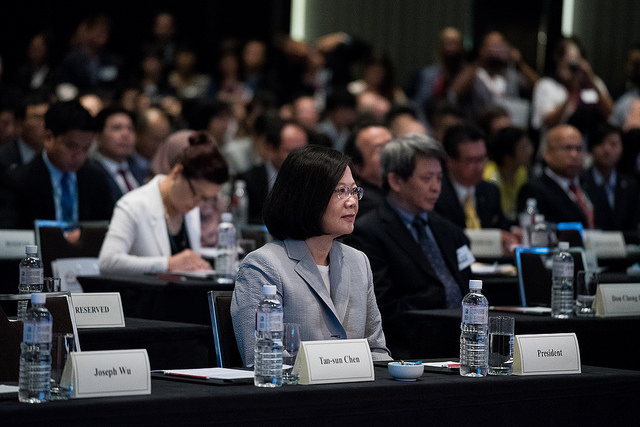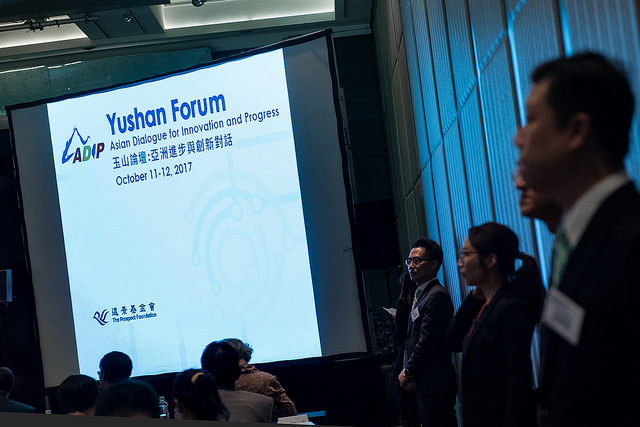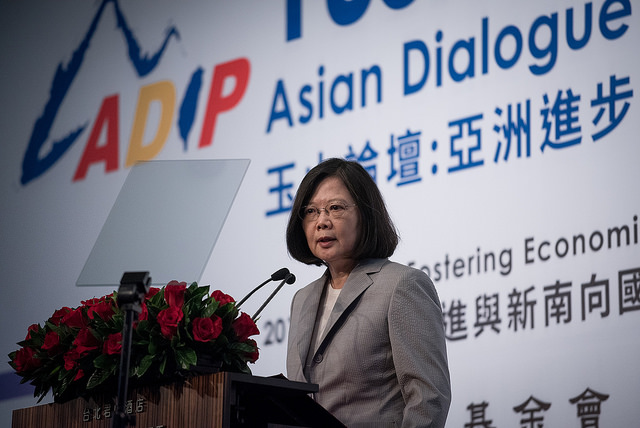News & activities
 News releases
News releases
Good morning! Let me begin by saying that the host, Dr. Mark Chen (陳唐山), and his team at the Prospect Foundation have done a wonderful job putting this event together. I also want to thank you for all the work you have done for the New Southbound Policy.
I would also like to thank all the participants that are here from over 20 countries. Many of you are members, former and present, of governments, think tanks, NGOs, enterprises, and civil society. It's great to welcome you to Taiwan, particularly those coming for the first time.
I want to acknowledge some of our distinguished and honourable guests here today:
From the Philippines, former Vice President Teofisto T. Guingona Jr.,
former Vice President Jejomar Binay Sr.,
and former Foreign Secretary Perfecto Yasay;
From the Republic of Korea, former Deputy Prime Minister Hyun Oh-Seok;
From Indonesia, former Coordinating Minister for Maritime Affairs Rizal Ramli,
and Deputy Wahyu Utomo for Coordination of Infrastructure and Regional Development of the Coordinating Ministry of Economic Affairs;
From Thailand, former Foreign Minister Kasit Piromya;
From Japan, former Director General of Defense Agency Kazuo Aichi,
former Minister of Agriculture, Forestry and Fisheries Tokuichiro Tamazawa,
and former Member of the House of Councillors Hideki Wakabayashi;
From the United States, former American Institute in Taiwan Chairman Ray Burghardt,
former Ambassador to Myanmar Derek J. Mitchell,
and Deputy Associate Administrator Michele Schimpp from the US Small Business Administration.
Your presence today is a great encouragement to us in the pursuit of our New Southbound Policy. We thank you for coming.
We're here today because all of us hold a collective interest in the future development of this region. The rise of Asia is already one of the most momentous changes in this generation. It has profoundly influenced both international security and the world economy.
Within Asia, the countries covered by our New Southbound Policy hold even greater potential. These countries are home to some of the fastest growing economies in the world. They are powered by a young, dynamic, and well-educated population.
I am proud to say that I had the opportunity to visit some of these countries in the past. I've spent time in India, Indonesia, Malaysia, the Philippines, Singapore, and Thailand. I have seen first-hand not only their storied history and vibrant culture, but also their high degree of interconnectivity with the rest of the world.
Taiwan has always played an indispensable role in the development of Asia. Over the years, we have been a source of capital, technology, and technical know-how. We have also built up enduring economic and industrial linkages with countries in Southeast Asia, as a leading source of foreign direct investment and trade.
But just as Asia is changing, Taiwan too must change. Rapid economic, social, and political changes in the region are bringing a host of new opportunities and challenges. What has worked in the past, may no longer work for the future. As a result, Taiwan must play an even more active and prominent role in order to participate in the future of the region.
Redefining Taiwan's role in the region is one of my highest priorities as president. To be clear, the New Southbound Policy is our new "Regional Strategy for Asia." Under this policy, we intend to work with countries in the region and around the world to deepen and broaden our presence in South and Southeast Asia.
I wish to emphasize that the New Southbound Policy is an inclusive policy. It does not come at the expense of other regional initiatives and is designed to complement, rather than compete against, the RCEP (Regional Comprehensive Economic Partnership Agreement), the One Belt One Road, and India and Japan's Freedom Corridor.
With our New Southbound Policy, one of our foremost objectives is to strengthen cooperation in terms of resources, talent, and market development. We want our private and public sectors to work together to forge mutually-beneficial ties, generate sustained economic growth, and improve people's lives in the region.
We have started with developing closer cooperation on trade, investment, tourism, and cultural exchanges over the past year.
We have also expanded scholarships and other financial assistance for students from New Southbound countries, leading to a rapid increase in overseas students studying in technical programs or universities here. Through the establishment of six investment windows in Southeast Asian countries and India, we have also encouraged more bilateral trade and investment. At the same time, we have relaxed visa restrictions on several New Southbound countries.
We are seeing the dividends of such efforts. Tourism from New Southbound countries has increased by 36.7% from the year prior. Trade has grown by almost 20%. The number of students from these countries has also increased by close to 10%. All of this has brought Taiwan and New Southbound countries closer together.
This has formed a solid foundation to pursue the next phase of the New Southbound Policy, i.e. our five flagship projects. These projects are directed at development in the following five major areas: human resources, innovation-based industries, regional agriculture, medical cooperation, and industrial supply chains. The establishment of policy forums and youth exchange platforms, such as the Yushan Forum, is part of such efforts.
Not only will these projects further entrench our presence in New Southbound countries, they will also help sustain the momentum we've created over the past year.
As much as the New Southbound Policy is about policies, it is also about our commitments to our neighbours in the region. In order to fulfil the region's needs and strengthen its sense of inclusiveness and community, we are prepared to make the following five commitments:
First, we will help nurture and empower the talent this region needs. Rapidly growing economies require skilled labour, engineers, and R&D personnel. Taiwan is the best talent incubator for the region as we have high-quality vocational schools and training centers, well-established higher education facilities, and the industry know-how.
Already we are providing many scholarships and educational opportunities to bring students from New Southbound countries to Taiwan. We are also expanding work-study course offerings, with a target of 5,000 students each year. These efforts will turn Taiwan into an Asian hub for industry talent development.
Second, we will share our experiences to help New Southbound countries establish domestic demand-driven industries.
For example, our industry development experience in fields such as petrochemicals, ICT, and the medical sector can help inject new driving force into New Southbound countries. This will not only assist in the development of domestic demand, but raise living standards as well.
Third, we will also help New Southbound countries with their infrastructure and major development projects. To achieve this, we will establish a 3.5 billion US dollar financing facility to be managed under our Official Development Assistance program (i.e. the Taiwanese version of ODA).
Fourth, we will help our SMEs and NGOs share their insight and experiences with New Southbound countries. We will place particular emphasis on helping job creation at the local-level in order to contribute positively to local communities.
Fifth, we will join forces with other like-minded countries in order to strengthen our common presence in the region. We believe this will benefit peace, stability, and prosperity, both here in the region and around the world.
With these commitments, I believe both Taiwan and New Southbound countries have much to gain. Taiwan will be able to entrench our presence in key regional markets, while many New Southbound countries gain the education, infrastructure, and industry experience they need to further develop their economies.
All of this highlights the mutually-beneficial nature of the New Southbound Policy.
Ladies and gentlemen, today marks the beginning of the very first Yushan Forum, also known as the Asian Dialogue for Innovation and Progress. The forum is named in honour of Yushan, or Jade Mountain. As East Asia's highest peak, it is a symbol of the spirit that drives Taiwanese to better ourselves.
As a new multilateral and diversified platform for regional dialogue, we hope the Yushan Forum will become a regular event. We want to bring people from both the public and private sectors together on a more regular basis to work towards a better region.
To this end, we will establish the "Taiwan-Asia Exchange Foundation" to act as the main organizing and administrative body of the Yushan Forum. This organization will also serve as an exchange platform for leaders, youth representatives, NGOs, and think tanks in the region.
I trust that this forum will also make a positive contribution by promoting innovation and progressive values both here in the region and around the world.
Through dialogue on a regional level, I also hope we can forge a common vision for our future.
In closing, I wish the forum every success. Thank you all for coming to Taiwan. Thank you.











